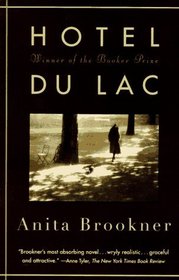Helpful Score: 3
Hotel du Lac, by Anita Brookner surprised me. The first forty or so pages, while beautifully written, were a tad tough to meander through at times. But then, oh then, all of a sudden, and at some point I can't recall, I was quite happy -- it pulled me in and although it's a quiet and contemplative story, it was really quite interesting and I felt at home with it.
Edith Hope is a romance writer who writes under another name -- she's accomplished, but to be honest, she writes about feelings and events that she's never sure she'll ever have, or at least have forever. She's withdrawn, and doesn't fit with her "friends."
Edith is sent away from "civilized" society in London to a quaint and quiet hotel in Switzerland following a scandal that it has been deemed should not occur amongst polite and learned men and women. While there, she encounters a sad variety of characters that initially seem almost so uninteresting, that they are interesting. Eventually, you are drawn into each one, into their nuances, their sad or internally destructive personalities. While one character, Mrs. Pusey initially impresses upon Edith that she is kind and lovely, it soon becomes evident that she's really just lacking in the same things that most of the hotel guests are without as well -- after all, why are they all sequestered in this hotel, away from family and friends, during a quiet time of season? It seemed to be that they all were suffering in some way.
Do not expect a flurry of events in the winner of the Man Booker Prize of 1984. Expect instead a quiet discussion, a studied review of a writer's perspective of those she meets and interacts with, amidst the background of an incredible hotel. There is not a hurry from one thing to another. It is a slow exercise of evaluation and word usage to describe each scene, moment, person. Could it be considered tedious and boring to some? Perhaps. Could it also be viewed as deceptively pleasing, slowly building the undercurrent of anticipation for something, something brilliant and cunning to breach the water line and unfold its secret? Yes.
At times, it was a bit humorous, but I found it to be an overall sad book, about people who were sad and who either were forced to be in exile by others, or simply had nowhere else that they could go. It's an insightful and thoughtful novel on love, loss, and regret. Although I wouldn't recommend it for everyone, I would say that if you like a quiet novel that delivers an introspective view on one's own life, then this sad little beauty is a book for you.
Edith Hope is a romance writer who writes under another name -- she's accomplished, but to be honest, she writes about feelings and events that she's never sure she'll ever have, or at least have forever. She's withdrawn, and doesn't fit with her "friends."
Edith is sent away from "civilized" society in London to a quaint and quiet hotel in Switzerland following a scandal that it has been deemed should not occur amongst polite and learned men and women. While there, she encounters a sad variety of characters that initially seem almost so uninteresting, that they are interesting. Eventually, you are drawn into each one, into their nuances, their sad or internally destructive personalities. While one character, Mrs. Pusey initially impresses upon Edith that she is kind and lovely, it soon becomes evident that she's really just lacking in the same things that most of the hotel guests are without as well -- after all, why are they all sequestered in this hotel, away from family and friends, during a quiet time of season? It seemed to be that they all were suffering in some way.
Do not expect a flurry of events in the winner of the Man Booker Prize of 1984. Expect instead a quiet discussion, a studied review of a writer's perspective of those she meets and interacts with, amidst the background of an incredible hotel. There is not a hurry from one thing to another. It is a slow exercise of evaluation and word usage to describe each scene, moment, person. Could it be considered tedious and boring to some? Perhaps. Could it also be viewed as deceptively pleasing, slowly building the undercurrent of anticipation for something, something brilliant and cunning to breach the water line and unfold its secret? Yes.
At times, it was a bit humorous, but I found it to be an overall sad book, about people who were sad and who either were forced to be in exile by others, or simply had nowhere else that they could go. It's an insightful and thoughtful novel on love, loss, and regret. Although I wouldn't recommend it for everyone, I would say that if you like a quiet novel that delivers an introspective view on one's own life, then this sad little beauty is a book for you.
Helpful Score: 3
Another classic character development from Anita Brookner. Her style of writing fascinates me - very slow, very staid, very proper. Longings and hidden agendas perculate under the surface of her complex women.
Helpful Score: 2
A very classy book.
Helpful Score: 2
In a magnificent landscape, most of the action takes place on an interior plane. In this book women who see themselves as most in need of a man find that they can do very well without one, thank you very much. The book is a triumph of gliding, impelled writing with each word, even the repeated ones, revealing character. Tops in its class.




